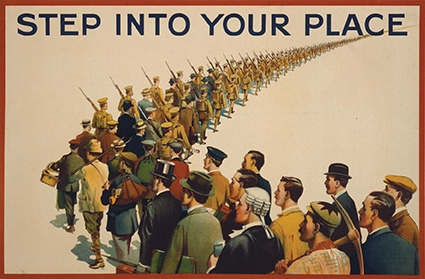Forced to Be a Hero: Ogden on Re-introducing Conscription
For those not in the know, Remembrance Day is a memorial day dedicated to members of the Armed Forces of the Commonwealth and Empire who gave their lives in service since the First World War. Though it is customarily observed on the 11th hour of the 11th day of the 11th month, the Sunday following Remembrance Day – Remembrance Sunday – is typically the day devoted to organized memorium.
I was fortunate enough to be invited to the Remembrance Day service at the British Embassy last week, and as well as touching base with a number of the British service personnel working in Georgia (I was only mildly disappointed that none were from my old regiment), I also managed to speak with a number of Georgian veterans from the Wounded Warriors program.
Meeting military amputees is always a poignant experience. That these men have been gravely injured in wars that have been invariably described as pointless (and in Georgia's case, arguably even more so) is tragic beyond description, but the fact that they are all universally cheerful, optimistic and upbeat is truly humbling. One trooper I spoke with had lost his leg in Iraq...and then gone to war again in Afghanistan with a prosthetic a few years later.
Much is made of the Georgian warrior spirit, but rarely does one see it manifest itself in human form. Little do the Georgian figures of lore, Vakhtang Gorgasali, Davit Soslani and Aghmashenebeli, resemble the middle-aged man patting his gut and boasting that he can eat fifty khinkali in a sitting, or the boy squatting on a street corner quaffing cheap beer and picking at sunflower seeds.
That these same people are fiercely proud of their culture and history is well-known to anyone familiar with this country, but what I’ve noticed amongst Georgians is that they have a tendency to speak of their country's past as though they were capable of the same feats. That the medieval Georgian warriors who stopped the Turks dead in their tracks at Didgori were brave beyond belief and deserve a slot in history alongside the Spartans at Thermopylae is undoubtedly true, but I don't imagine that the majority of Georgian men today would be capable of standing with them. The men I met this last weekend are exceptions, with the kind of bravery and character that most Georgians males would like to think they possess despite the fact that most of them have actively avoided mandatory military service and would balk at the idea of enlisting.
I mention all this due to the government's about-turn on abolishing conscription. A friend of mine, who serves in the United States' Army Special Forces and works training his Georgian counterparts, told me that Tinatin Khidasheli, the previous Defence Minister, admitted that she knew little and less of military affairs, and would listen to the Georgian General Staff and her foreign advisors. Her abolition of conscription was a welcome step in the country, especially hailed by a populace unwilling to serve in the Army. Her replacement, Levan Izoria, who has also never served a day in uniform, has decreed that Georgia, as a small country, does indeed need military conscription.
Military history has shown that conscripts perform poorly compared to regular, professional troops, but at least Western conscripts during the World Wars believed in the battle they fought; military acquaintances (including some who were conscripted) have told me that the last real test of Georgia's conscript-based military in 2008 ended in disaster. Men who were understandably concerned for their families and friends and who had never regarded their brief (frighteningly brief) service as anything but a frustrating, depressing waste of time, simply could not stand in the face of a Russian onslaught and fight a war they knew they were sure to lose.
Izoria has claimed that conscript training will be improved and updated, and the equipment issued to these citizen soldiers will be more modern and resemble that used by Georgian regulars. Despite what Minister Izoria believes, none of this will help improve the performance of the conscript in the field. Unless a man has signed his name in anticipation of doing his duty and facing the fear, the blood, the noise and the horror of combat, those forced into it will be far more of a hindrance than a help. Friends who were dragged to the front line in 2008 told me they saw men flinging away rifles and running for their lives, with one apparently saying, “Georgia has survived the Russians twice before, we can do it again. Fighting will solve nothing.” There is simply no way to know, or even guess, as to how many of those forced into a uniform would agree with him. Not every man – no matter the country – has it in him to be like the heroes of the legends, or like the living, breathing heroes I met last weekend.
Tim Ogden












